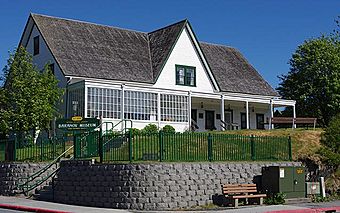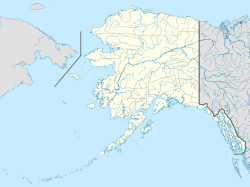Kodiak History Museum facts for kids
|
Kodiak History Museum
|
|

Modern view of the building
|
|
| Location | 101 East Marine Way, Kodiak, Alaska |
|---|---|
| Area | less than one acre |
| Built | 1808 |
| Built by | Russian-American Company |
| NRHP reference No. | 66000954 |
Quick facts for kids Significant dates |
|
| Added to NRHP | October 15, 1966 |
| Designated NHL | June 13, 1962 |
The Kodiak History Museum is a cool place to learn about the past in Kodiak, Alaska. Until 2019, it was known as the Baranov Museum. This museum is located inside a very old and important building. It's called the Russian-American Magazin or the Erskine House.
This building was constructed around 1810. It's special because it's the oldest of only four buildings still standing that were built by the Russians when Alaska was their territory. The museum's collections and displays focus on the history of the Kodiak Archipelago and the Aleutian Islands. They especially highlight the time when Russians and early Americans lived there. Sarah Harrington is the museum's current director.
Contents
The Museum Building: A Look Back
How Kodiak Started
The town we now call Kodiak was first named Pavlovsk in 1793. It was the very first permanent Russian settlement in North America. For a while, it was even the capital of Russian Alaska. This lasted until 1808.
What the Building Was Used For
The museum building was constructed in the early 1800s. It was built as a storage facility, or "magazin," by the Russian-American Company. This company was a big trading business run by the Russians.
When Alaska became part of the United States, the building was bought by the Alaska Commercial Company. This new company continued the same types of businesses the Russians had.
In 1911, a person named W. J. Erskine bought the building. He turned it into his private home. He also added a new stone foundation and enclosed the porch. He sold it in 1948 to a company that rented it out.
Surviving Disasters
After a huge earthquake and tsunami hit Kodiak in 1964, the city was badly damaged. The building was then taken over by a government group working to rebuild the city. Eventually, the city of Kodiak owned the building. In 1967, the city leased it to the Kodiak Historical Society. This society has taken care of the building ever since. They use it for their offices and as the museum.
The building was recognized as a National Historic Landmark in 1962. It was also added to the National Register of Historic Places in 1966. This means it's a very important historical site.
What the Building Looks Like
The museum building is a large, rectangular structure made of logs. It now sits on a strong concrete foundation. It has 2 and a half stories. It is about 11 meters (36 feet) deep and 22 meters (72 feet) wide. There's a porch at the front that is partly enclosed with glass.
The outside is covered with horizontal redwood siding. This siding covers older material that might be from the original Russian construction. The roof is steeply sloped and has a single window (dormer) on the main side.
The inside of the building has been changed a lot over time. These changes were made to fit the historical society's needs. However, many of the original parts of the building are still visible. For example, the inside was first divided into two big rooms by a log wall. This wall is still there, even though doorways were cut into it later. The stairs going up to the second floor also seem to be original. The upstairs floor looks like it was made using typical Russian building methods.
See also
- List of the oldest buildings in Alaska
 | William M. Jackson |
 | Juan E. Gilbert |
 | Neil deGrasse Tyson |


